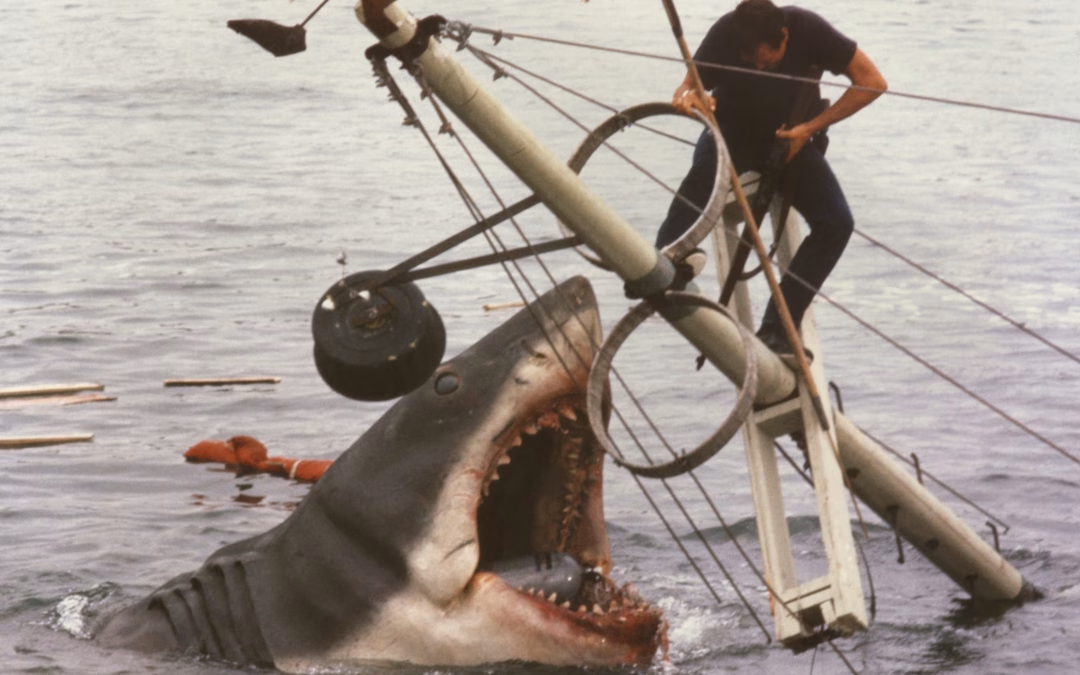“Every struggle in your life will become a story someday. It will either be a story about how you persevered or a story about why you gave up.” Dave Willis
Summer 1974 – Martha’s Vineyard, Massachusetts: “The damn shark’s broken again,” came a frustrated voice over the bullhorn. The young movie director offered a few expletives and shook his head. He shouted to the crew, “OK, everyone, be back on the set in two hours!” Then he whispered where no one could hear, “That shark is going to get me fired.”
Growing up in Cincinnati, Ohio, Steven Spielberg was fascinated with movies, and at age 12, he began making amateur films with his mother’s home movie camera. He hoped to attend the University of Southern California School of Cinematic Arts, but after being turned down three times because of his grades, he settled for California State University – Long Beach Film School. He left before graduating to land an internship at Universal Studios in Hollywood, where his hard work, creativity, and attention to detail impressed executives.
In early 1974, Universal Studios purchased the movie rights to Peter Benchley’s bestselling book Jaws for $160,000 and selected Spielberg to direct the film. Jaws was the 27-year-old director’s second movie. Despite being told it was a huge mistake, he decided to film the movie in the Atlantic Ocean off Martha’s Vineyard rather than use the studio tanks at Universal. With a budget of $3.5 million and a 55-day production schedule, filming began May 2, 1974.
No one knew anything about shooting a film in the Atlantic. From the start, the ocean rarely cooperated. Wind and waves frequently pushed the dozen boats involved in the filming out of position. Crews frequently pulled up anchors and re-positioned boats. Sea sickness, sunburn, and long hours under the hot sun caused shooting delays.
The three 25-foot-long mechanical sharks, all nicknamed “Bruce” after Spielberg’s lawyer, were constructed from steel and fiberglass and weighed more than a ton each. They were controlled by a hydraulic system that wasn’t designed for salt water, and the first time a shark was put in the water it sank 30 feet to the bottom. They broke down constantly resulting in extended delays.
The first time John Williams played his ominous two-note score, “da-duh, da-duh, da-duh.” on the piano, Spielberg laughed. He thought it was a joke. He responded, “John, you’re kidding, right?” Williams asked Spielberg to give it a chance, and once the music was paired with shark attack scenes, Spielberg changed his mind. The two-note score became essential in building suspense.
Adding to Spielberg’s challenges, there was fighting among cast members. The issues were mainly between Richard Dreyfuss, who played the young oceanographer Cooper, and Robert Shaw, a heavy drinker who played the grizzled shark fisherman Quint. Shaw constantly insulted Dreyfuss and made fun of him.
“After my first week on the Jaws set, I was convinced the movie would ruin Steven Spielberg’s career.” Richard Dreyfuss said later. “We were shooting in the ocean with mechanical sharks that wouldn’t work.” Crew members started referring to Spielberg’s movie as Flaws.
On several occasions, Universal Studios executives considered replacing Spielberg. Their visits to the set terrified him, and he cried in his hotel room fearing the movie would be canceled. The movie’s producer, Richard Zanuck, repeatedly defended Spielberg and saved his job.
Filming dragged on at a snail’s pace through the summer and fall of 1974, and it finally wrapped up on October 6, more than 150 days behind schedule. The movie cost $12 million, three times the budget. Because the filming was late, the release date had to be moved from Christmas to the summer of 1975, further frustrating Universal.
Jaws premiered June 20, 1975, in 450 theaters across America with low expectations. The long lines outside movie theaters surprised the executives at Universal. On the first weekend, the movie grossed $7 million, a record. Jaws earned $470 million worldwide, equivalent to $1.5 billion today. It quickly became the highest-grossing movie of all time.
Jaws won three Academy Awards: Best sound, best film editing, and best original score. It was nominated for best picture, losing out to One Flew Over the Cuckoos’ Nest. The movie also created Jaws-mania, driving millions of movie-goers out of the water, some for years.
Today, 78-year-old Steven Spielberg is widely regarded as one of the greatest film directors of all time. According to the legendary director, “I thought my career might be over before it even began. Making Jaws was the hardest thing I ever did. The movie that I thought would end my career, actually launched my career.”

50 years ago this summer, I entered Navy bootcamp at Great Lakes Naval Training Center. Toward the end of our nine weeks of training, my company was awarded a weekend pass. Many of us took the train to nearby Waukegan where we went to see the movie “Jaws”. It was a nice reprieve from our daily routine!
Great story. Thanks for sharing.
Since seeing that movie, my wife will not get in the Gulf of America above her ankles!!
The story about the the movie is just as good as the movie…thanks for telling it!!